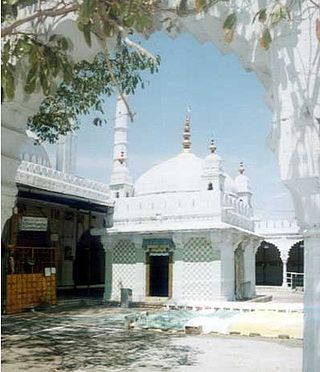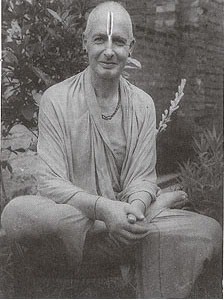
Sai Baba of Shirdi, also known as Shirdi Sai Baba, was an Indian spiritual master and fakir, considered to be a saint, revered by both Hindu and Muslim devotees during and after his lifetime.

Khawaja Syed Muhammad Nizamuddin Auliya, also known as Hazrat Nizamuddin, Sultan-ul-Mashaikh and Mahbub-e-Ilahi, was an Indian Sunni Muslim scholar, Sufi saint of the Chishti Order, and is one of the most famous Sufis from the Indian Subcontinent. His predecessors were Fariduddin Ganjshakar, Qutbuddin Bakhtiyar Kaki, and Moinuddin Chishti, who were the masters of the Chishti spiritual chain or silsila in the Indian subcontinent.

Mu'in al-Din Hasan Chishti Sijzi, known reverentially as Khawaja Gharib Nawaz, was a Persian Islamic scholar and mystic from Sistan, who eventually ended up settling in the Indian subcontinent in the early 13th-century, where he promulgated the Chishtiyya order of Sunni mysticism. This particular Tariqa (order) became the dominant Islamic spiritual order in medieval India. Most of the Indian Sunni saints are Chishti in their affiliation, including Nizamuddin Awliya and Amir Khusrow.

Ramdas, also known as SamarthRamdas or Ramdas Swami, was an Indian Hindu saint, philosopher, poet, writer and spiritual master. He was a devotee of the Hindu deities Rama and Hanuman.

Kirpal Singh was a spiritual master (satguru) in the tradition of Radha Soami.

Diksha also spelled diksa, deeksha or deeksa in common usage, translated as a "preparation or consecration for a religious ceremony", is giving of a mantra or an initiation by the guru of Indian religions such as Hinduism, Buddhism, and Jainism. Diksa is given in a one-to-one ceremony, and typically includes the taking on of a serious spiritual discipline. The word is derived from the Sanskrit root dā plus kṣi or alternately from the verb root dīkṣ. When the mind of the guru and the disciple become one, then we say that the disciple has been initiated by the guru. Diksa can be of various types, through the teacher's sight, touch, or word, with the purpose of purifying the disciple or student. Initiation by touch is called sparśa dīkṣā. The bestowing of divine grace through diksa is sometimes called śaktipāt. Another type of diksha, into a monastic order, involves a vow of celibacy, renunciation of all personal possessions and of all worldly duties, including family ties. Diksha has the same meaning in Jainism. Diksha is also called Charitra or Mahanibhiskraman in Jainism. Initiation in Hinduism involves performing one of several rituals depending on the person being initiated and the Hindu group involved.

The guru–shishyatradition, or parampara ("lineage"), denotes a succession of teachers and disciples in Indian-origin religions such as Hinduism, Jainism, Sikhism and Buddhism. Each parampara belongs to a specific sampradaya, and may have its own gurukulas for teaching, which might be based at akharas, gompas, mathas, viharas or temples. It is the tradition of spiritual relationship and mentoring where teachings are transmitted from a guru, teacher, or lama, to a śiṣya, shramana (seeker), or chela (follower), after the formal diksha (initiation). Such knowledge, whether agamic, spiritual, scriptural, architectural, musical, arts or martial arts, is imparted through the developing relationship between the guru and the disciple.

Siddharudha Swami is an Indian Hindu guru and philosopher.

Pir or Peer is a title for a Sufi spiritual guide. They are also referred to as a Hazrat and Sheikh or Shaykh, which is literally the Arabic equivalent. The title is often translated into English as "saint". In Sufism, a Pir's role is to guide and instruct his disciples on the Sufi path. This is often done by general lessons and individual guidance. Other words that refer to a Pir include Murshid and Sarkar.

Upasani Maharaj, born Kashinath Govindrao Upasni, was an Indian spiritual teacher, considered by his disciples to be a satguru. He lived in Sakori, British India, and is said to have received God-realization from Sai Baba of Shirdi. Upasani himself was one of the principal masters of Meher Baba.
Khwaja Usman Harooni was an early modern wali or Sufi saint of Islam in India, a successor to Shareef Zandani, sixteenth link in the Silsila of the Chishti order, and master of Moinuddin Chishti. Usman Harooni was born in Haroon, Iran. His year of birth is variously given as 1096, 1116 and 1131 AD. He is also known by the nicknames Abu Noor and Abu Mansur.

Ram Charan (1720–1799)) is the Rajasthani Hindu guru, inspirator of a religious tradition called Ramsnehi Sampradaya or Ramdwara. He initiated and illustrated Nirguna (absolute) Bhakti, although he was not against Saguna Bhakti. He initiated and tried to eliminate "show", blind faith, hypocrisy and misled existing in the Hindu religion and preferred to worship the 'name of God', Rama, over God, to not get involved in false "show" activities.

Burhanuddin Gharib was an Indian Sufi of the Chishti Order. He was one of the caliphs of the famous Sufi Saint Nizamuddin Awliya.

Swami Nigamananda Paramahansa was an Indian yogi, guru and mystic in Eastern India. He is associated with the Shakta tradition and a spiritual master of vedanta, tantra, yoga and prema or bhakti. His followers referred him as Thakura.

Syed Sultan Mahmoodullah Shah Hussaini, also known as "Shah ji", was a renowned Muslim Sufi, saint and scholar of the Quadri, Chisti order from the Indian subcontinent. He was the native of Kurnool. His most famous disciple and spiritual successor was Machiliwale Shah, who in turn became the spiritual master of India's noted Sufi saint.
Janardan Swami, or simply Janardan or Janardana was an Indian Hindu scholar, statesman, poet and saint. He was the spiritual guru of prominent 16th-century saint Eknath. His compositions were mostly written in Marathi. He also wrote a few verses in Braj.

Sri Krishna Prem, born Ronald Henry Nixon, was a British spiritual aspirant who went to India in the early 20th century. Together with his spiritual teacher Sri Yashoda Mai, he founded an ashram at Mirtola, near Almora, India. He was one of the first Europeans to pursue Vaishnavite Hinduism, and was highly regarded, with many Indian disciples. Later, according to the account of his foremost disciple Sri Madhava Ashish, Krishna Prem transcended the dogmas and practices of the Gaudiya Vaishnava tradition into which he had been initiated and affirmed a universal spiritual path shorn of "orthodoxy" and blind traditionalism.

Sri Ramakrishna the Great Master, translated by Swami Jagadananda, is an English translation of the Bengali biography Sri Ramakrishna Leela Prasanga, of Sri Ramakrishna, the 19th-century Indian saint and mystic. Its Bengali original was written by Swami Saradananda, which is based on interviews of persons who knew or interacted with him. It is therefore a first-hand source. The original Bengali version published was composed in five volumes and was the first full-scale biography of the saint. This is an eyewitness account and therefore carries more credibility than later books on Sri Ramakrishna. The English translation was first published in 1952. The original Bengali book was written from 1909 to 1919, over a period of ten years, in order to repay the debt incurred for constructing Udbodhan House for Holy Mother Sri Sarada Devi.

Syed Baba Fakhr al-Din al-Hasani al-Hussaini commonly known as Baba Fakhruddin was a Persian Sufi of Suhrawardiyya order from present-day Eastern Iran.

Siddeshwar Swami was an Indian Hindu saint and spiritual leader known for his teachings on yoga and spirituality. Swami was the head of Jnanayogashrama, an ashram in the city of Vijayapura, in the Indian state of Karnataka. He declined the Padma Shri, India's fourth-highest civilian award, when it was awarded to him in 2018. He had earlier declined an honorary doctorate from the Karnatak University.

















